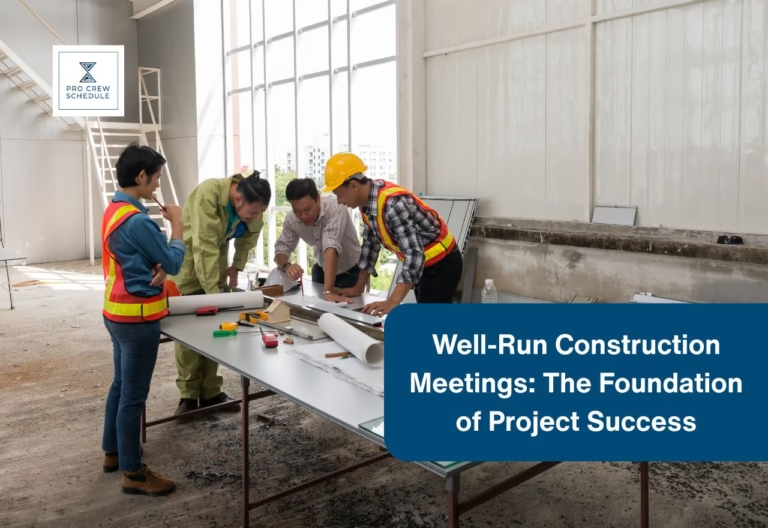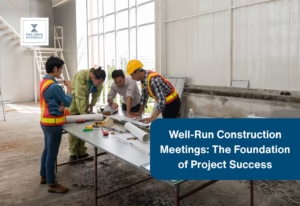Well-managed construction meetings are the key element of any project that ends up being successful. Be it a short toolbox talk or an elaborate project update, meetings synchronize teams, address concerns, and keep the ball rolling.
At the same time, however, the results of construction meetings are not the same in every case. Without distinct goals, structure, and proper follow-up, meetings can easily become time-consuming, confusing, and even contribute to delays in the project.
This publication provides you with the best practices for conducting efficient construction meetings, from preparation to post-meeting execution. You will be acquainted with the strategies that will enable you to maximize the impact of meetings, enhance communication, and make use of digital tools to increase the rate of efficiency and accountability.
What is a Construction Meeting?
A construction meeting is a pre-arranged assembly of the people involved in the project to plan their actions, solve the problems, and make major decisions. Such meetings can take different forms and occur at various frequencies with respect to the project phases, but still, the aim is the same: to keep the parties in sync and to ensure the flow of work.
Essentially, construction meetings are centered on the issues of clarity and momentum. They let the people involved reconsider the situation, orchestrate the tasks, deal with the difficulties, and decide what comes next, all done with the right people who can make decisions instantly.
Who comes depends on what kind of meeting it is. A toolbox talk might include only the site workers, whereas a weekly progress meeting could consist of the project manager, construction manager, general contractor, and all subcontractors. At the more strategic level, the client, consultants, or commercial representatives might also be involved.
The crucial thing is to make sure that everybody attending has a direct role in the work that is being talked about or in the decisions that are being taken.
Who Are the Construction Meetings Key Participants?
Depending on the project size and aim, construction meetings may encompass a variety of participants. These gatherings are the ones to which the people directly responsible for planning, execution, and decision-making come together.
- General Contractors: They are usually the ones conducting and moderating the meeting. They compose the agenda, define the mood, and bring up matters pointed out during project and crew coordination.
- Owners or Client Representatives: They are the ones who make the major decisions and approvals, making sure that the project outcomes are in line with the expectations and the budget.
- Architects and Engineers: They are usually referred to as the design team and they provide the technical input, reply to RFIs, grant submittals, and ensure that the construction is done according to the design specifications.
- Project Management Team: They are the ones who share updates, report difficulties, assign tasks, and communicate progress and safety reports.
- Consultants: They provide specialized knowledge concerning project components, which aids the proper execution of complex elements.
- Inspectors: They might participate in meetings for the purpose of clarifying regulatory or compliance issues, mainly in environments that are technically demanding or critical for safety.
What Are the Construction Meeting Types?
Different meetings are still present throughout the project life cycle but they all serve distinct purposes. Recognizing when and how to hold each one improves coordination, cuts down on delays, and keeps everybody well-informed.
Pre-Start Meetings
These are the meetings that are also known as pre-construction meetings and are the ones that are held at the very start of a project or just prior to a new phase. They are the ones that bring all parties together in terms of scope, sequencing, safety protocols, schedules, and expectations. Also, these meetings are the ones that help to discover possible problems ahead of time, before site work starts.
Toolbox Talks
Short, concentrated safety talks generally take place before shifts. They bolster proper work habits, point out specific hazards on the site, and make sure that every worker knows his or her position and responsibility.
Site Coordination Meetings
These meetings, which often take place weekly, are a gathering of the most important trades to solve the problems arising on-site, evaluate the progress made, and alter the plans according to the real-time conditions of the site. These talks are vital in those projects where various trades are interdependent to keep the timeline. Using construction crew planning software will enable more productive site coordination meetings by giving teams the chance to coordinate their manpower schedules, allocate shifts, and monitor resource availability—all through one platform.
Progress or Status Meetings
These meetings deal with overall performance and they monitor the milestones, schedules, budgets, and risks associated with the project. Usually, the participants are the general contractor, project manager, and representatives from the client side.
Safety Meetings
These are not toolbox talks but rather formal reviews concentrated on inspections, incident reporting, compliance checks, and risk assessments. The attendance usually comprises safety officers, supervisors, and trade leads.
Client or Owner
These meetings are scheduled at intervals to give high-level updates, obtain approvals, and review major decisions. Topics of the discussions may include money matters, timelines, or variations and are usually attended by top leadership and the client team.
What Should You Record During a Construction Meeting?
The effectiveness of a meeting often depends on what’s documented. Keeping minutes organized and actionable ensures that discussions translate into real progress.
Essential details include:
- Date and time of the meeting
- Meeting location
- List of attendees
- Apologies for absences
- In addition, a standard construction meeting should cover:
- Administrative matters
- Safety concerns
- Program updates and discussions
- Design-related topics
- Environmental considerations
- Quality issues
- Traffic management
- Commercial and contractual matters
- Procurement updates
These categories form a solid framework for comprehensive meeting minutes. To make them more actionable, include a column or section for assigned responsibilities and due dates for each item.
How to Conduct a Construction Meeting that is Productive
A productive construction meeting is not a lucky break—it is a well-prepared, structured, and effectively led meeting. These steps will make sure that your meeting is not just a waste of time:
Plan
Look through the current project documents, past meeting minutes, and the input of the clients or consultants. Being well-prepared allows you to discuss without the need to look for files or go over old points.
Set Clear Goals
Determine what the meeting should achieve and tell all participants. It might be the resolution of a particular problem or the outlining of the next steps; a lucid goal keeps the meeting on track.
Build and Communicate an Agenda
Your agenda should be organized with the time limit specified for each topic and also sent before the meeting. This gives the participants time to get ready and also helps maintain the presence of the meeting.
Promote Open Communication
Invite participation from all people concerned. Speak to the people who usually do not speak much and ask the dominant ones to let others talk. The most productive meetings are those with even participation.
Designate Responsibilities and Next Steps
Action items should all be assigned a person responsible and a due date. If there is no accountability, the problems might get worse, and you would have to discuss them again in the next meeting.
Write and Follow Up
Make a note of actions and decisions clearly. Thereafter, share the minutes and bring pending matters to the discussion in the next meetings to make sure that accountability and progress are in place.
Integrating crew planning software for construction along with your meeting process can keep task assignments and schedules updated in real-time so that every department is always on the same wavelength.
Tools for Construction Meeting Management
The right construction management software makes it much easier to manage construction meetings effectively. These tools together manage scheduling, task tracking, and communication—reducing the amount of manual work and helping the teams organize themselves through several projects.
One very helpful tool is construction scheduling software, which makes it possible for teams to see project timelines, set milestones, and track progress in real-time. By having schedules and documents in a single platform, the teams can cut down on administrative work and keep accountability clear.
For instance, Pro Crew Schedule provides a dynamic construction scheduling software that allows the teams to facilitate meetings, control deadlines, and keep everybody in sync—from field staff to top management.
Final Thoughts
Meetings that are well-organized are the very foundation that supports construction projects. If they are planned properly, directed correctly, and provided with the right follow-up, they will not cause delays in the workflow; on the contrary, they will accelerate it. Teams can thus conduct fewer meetings and yet do more work with suitable preparation, communication, and digital tools.
Besides strengthening accountability, effective meetings also improve coordination among trades and help build trust between field and office teams. If coupled with reliable construction management software, meetings will be transformed into times when smarter, data-driven decisions are made to keep the projects on time and within budget.







